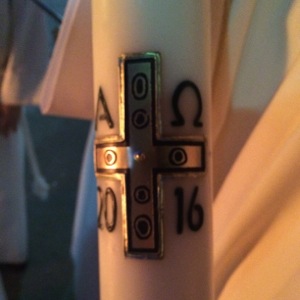 MONG THE MOST extraordinary texts of the Roman Rite, the Exsultet is sung but once a year. That’s it. Once. Sung during the Easter Vigil, the Exsultet is perhaps the most astonishingly merciful and loving texts, and it comes at the culmination of the liturgical calendar when we await the Risen Christ.
MONG THE MOST extraordinary texts of the Roman Rite, the Exsultet is sung but once a year. That’s it. Once. Sung during the Easter Vigil, the Exsultet is perhaps the most astonishingly merciful and loving texts, and it comes at the culmination of the liturgical calendar when we await the Risen Christ.
“Our birth would have been no gain, had we not been redeemed.” God’s mercy is expressed in words humankind could never conceive of on our own. Read and reread this astounding phrase:
O truly necessary sin of Adam, destroyed completely by the Death of Christ! O happy fault that earned so great, so glorious a Redeemer!
Such a reference to original sin—a positive reference—seems quite strange to us. We’ve always been programmed to think negatively upon our sin and for good reason. But such is the mercy of God who sent his only begotten Son. Such is Christ’s Redeeming power: “Who for our sake paid Adam’s debt to the eternal Father…”

 OLY WEEK IS EXHAUSTING BOTH PHYSICALLY AND EMOTIONALLY. It is beautiful in that it consumes us completely in prayer. Much of it is pure privilege. (Not to be confused with professional compensation. Church musicians are as a rule overworked and underpaid.)
OLY WEEK IS EXHAUSTING BOTH PHYSICALLY AND EMOTIONALLY. It is beautiful in that it consumes us completely in prayer. Much of it is pure privilege. (Not to be confused with professional compensation. Church musicians are as a rule overworked and underpaid.)
The older I get, the more I savor the joy and privilege that is Holy Week. It demands complete gratitude to God.
The following is my personal list of things I find to be pure privilege. It is but a small and very incomplete list and in no particular order, but these immediately come to mind. You certainly may have your own list!
2 • It is pure privilege to sing the threefold (and polyphonic) Lumen Christi in procession with a choir scattered throughout the Church—yet sung sing as one voice.
3 • Pure privilege to watch a full church fully lit only by the flame of the Paschal Candle. “…a fire into many flames divided, yet never dimmed by the sharing of its light…”
4 • It is pure privilege to make music in prayer with so many night after night. They become family.
5 • Pure privilege to witness the tears of joy a woman watching her fiancé be baptized at the Easter Vigil.
6 • Pure privilege to sing the Easter Sequence, the Nos Autem on Holy Thursday, and the Resurrexi on Easter Sunday, etc…
7 • Opportunity to evangelize on Easter Sunday to hundreds who don’t frequently attend Mass is pure privilege.
8 • Sacred music is part of the formation of the catechumens and candidates. It is pure privilege to support them throughout the year as well as when they become neophytes.
9 • Pure privilege to serve God and His people.
What is on your list?
Surrexit Dominus vere, alleluia!

